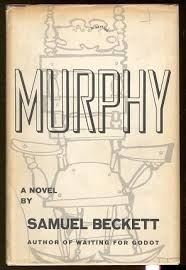Murphy
by Samuel Beckett
1938
July 8, 2016
In a recent article about Beckett’s prose, the Guardian called him the “maestro of failure”, and described his work as being “a hypnotic flow of words, the meaning of which is initially utterly obscure…. but persevere and patterns emerge:” Or as one of his character says in this novel “It was like difficult music heard for the first time.” Indeed, the complexity of this novel is such that it is one of those rare works that sometimes requires reference to an annotated version giving a page by page guide.
This understanding – that his work is complex but full of patterns and themes – is arguably the key to reading all Beckett, but applies particularly to his prose, including this relatively early novel. This is not difficulty for the sake of it, obscurantism, but complexity. In this novel Murphy, an Irishman of indeterminate profession, likely none, lives in exile in a condemned apartment in suburban London. He is an eccentric character – when the novel opens we find him naked in the dark, tied to a rocking chair. This appears to be more a form of meditation than sexual perversion! Murphy’s acquaintances are introduced as Beckett assembles his cast. Neary and Wylie, friends, Celia, Murphy’s lover and reluctant prostitute, and Cooper, Neary’s dull-witted assistant. Pressurised by Celia, Murphy finds a job as a nursing attendant at the Magdalen Mental Mercyseat in North London, a hospital for the insane, where he feels completely at home. The supporting cast attempt to track him down, but he eludes them by dying, apparently by suicide, caused by an opportune gas leak.
This is not really the stuff of a well rounded novel. The characters are mainly two dimensional, deliberately so. Beckett repeatedly breaks the fourth wall and acknowledges that this is a novel – for example when writing about Celia’s profession he says:
“this phrase is chosen with care, lest the filthy censors should lack an occasion to commit their filthy synecdoche.” This is Brechtian before Brecht, which is all the more striking for such an early work. Elsewhere the origins of Beckett the existentialist playwright can be quite clearly traced in this novel. There is a dark, nihilist streak to many of the characters and observations: A child is called the “eldest waste product” and elsewhere people are referred to as “bacteria”. Beckett is the ultimate poet of despair – “So all things limp together for the only possible purpose”, and there is even the refrain referencing the mixed message of hope and damnation from the crucifixion, picked up years later in (I think) ‘Endgame’, ‘Remember also one thief was saved”
But this bleakness is undercut by the absurdist humour that again is a characteristic of all Beckett’s writing (‘Waiting for Godot’ is a very funny play, despite its reputation, and despite the essential bleakness of its message – “They give birth astride of a grave, the light gleams an instant, then it’s night once more”) The humour derives mainly from the absurd, often surreal situations the characters endure, which often reminded me more of Flann O’Brien, surely an obvious influence, more than Joyce, Beckett’s acknowledged mentor.
One of the things I noticed about Beckett’s prose in this novel (and hold your breath, this is possibly an original observation) is the tendency to break out into verse, particularly when characters are speaking. Here are a few quotes:
“It was a strange room, the door hanging off its hinges, and yet a telephone. But its last occupant was a harlot, long past her best, which had been scarlet.”
“The syndrome known as life is too diffuse to admit of palliation. For every symptom that is eased, another is made worse. The horse leech’s daughter is a closed system. Her quantum of wantum
“She was willing a little bit of sweated labour, incapable of betraying the slogan of her slavers, that since the customer or sucker was paying for his gutrot ten times what it cost to produce and five times what it cost to fling in his face, it was only reasonable to defer to his complaints up to but not exceeding fifty per cent of his exploitation.”
“Oh hand in hand, let us return to the dear land of our birth, the bays, the bogs, the moors, the glens, the lakes, the rivers, the streams, the brooks, the mists, the – er – fens, the – er – glens, by tonight’s mail train”’
“Simplicity is as slow as a hearse and as long as a last breakfast”.
“It is too painful. Then you shall not find me ungrateful”.
“politeness and candour run together, when one is not fitting neither is the other. Then the occasion calls for silence, that frail partition between the ill-concealed and the ill-revealed, the clumsily false and the unavoidably so.”
Try writing these as verses and you will see what I mean. Take the third example, rewritten as verse:
“She was willing a little bit of sweated labour,
incapable of betraying the slogan of her slavers,
that since the customer or sucker was paying for his gutrot
ten times what it cost to produce and five times what it cost
to fling in his face,
it was only reasonable to defer to his complaints
up to but not exceeding
fifty per cent of his exploitation.”
I hear a kind of poetry in these lines. The half rhymes, repetition, and assonance give the narrative a dramatic quality that was to translate so well onto the stage.
Beckett will always remain one of the greatest playwrights of the twentieth century, but this shouldn’t detract from an appreciation of his prose. This novel is fascinating, complex, dark and at times confusing – but if any author deserves the benefit of the doubt it is Beckett.



No comments:
Post a Comment